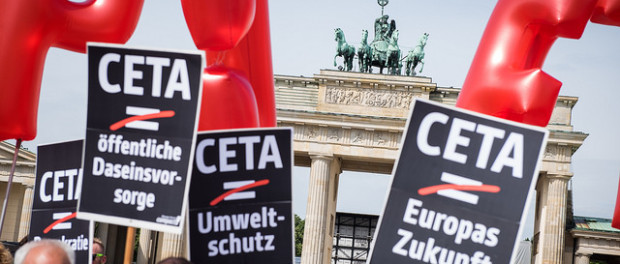Barry Finnegan of ATTAC Ireland explains how Ireland’s upper house voted – by a single ballot – against CETA last week. He also points to the wider implications of this (albeit) non-binding vote – the first of its kind in an EU member state parliament. This article originally appeared on the ATTAC.IE

On Wednesday 5th October, 2016, the Irish senate voted to reject the ‘provisional application’ of the CETA[i] – the controversial EU-Canada free ‘trade’ deal. The non-legally binding motion[ii] passed because the main opposition party, Fianna Fáil, abstained[iii]. If Fianna Fáil follow through on their general election manifesto commitment and reject the setting-up of an unreformed private ‘court’ in CETA in the upcoming legally binding vote in the Dáil [the Irish lower house of parliament], then Ireland will have officially rejected the CETA and the EU will be obliged to reject the permanent adoption of the agreement.
While it is the first parliamentary vote the current Irish government has lost, and is very embarrassing for the Fine Gael party of government, this pro-austerity party, aligned to the European Peoples’ Party (EPP) in the European Parliament, will most likely ignore the voice of the senate and vote with other EU member state trade ministers to approve the ‘provisional application’ of the CETA at an EU Council of Ministers meeting in Brussels on 18th October.
The Civil Engagement Group[iv], Sinn Féin, the Labour Party, the Greens, and independents voted in favour this historic motion. Irish development, environment, trade union and financial reform civil society groups, whose anti-CETA campaign has until now[v] gone largely ignored by the Irish media, responded positively to the senate vote.
David Joyce of the Irish Congress of Trade Unions[vi] said, “Congress congratulates Senator Higgins and those who supported this motion. We hope this will help kickstart a badly-needed debate on this proposed trade deal, which is opposed by unions across the EU [,Canada] and the United States. The CETA agreement is a precursor of the controversial Transatlantic Trade and Investment Partnership (TTIP) and includes many of the same key provisions, including the Investor Court System, which Congress has previously described as an ‘affront to democracy’.”
Contextualising the vote, Barry Finnegan[vii], researcher with ATTAC (Ireland), said, “Fianna Fáil need to be praised for this courageous, pro-democracy stance in the Seanad [the Irish senate]. While the party has a recent neoliberalist history, it also has a longer, republican and social democratic history going back to its 1927 split with Sinn Féin. In this year’s general election, the party’s manifesto declared[viii] its opposition to ISDS – the private ‘court’ system at the core of CETA which would empower foreign companies to sue governments when laws interfere in their real or imagined future unearned profits. In this year of 2016, the centenary of the 1916 rebellion against British colonial rule of Ireland, Fianna Fáil have obviously listened to the judiciary of Germany and Europe, and realised that the reforms to ISDS demanded in July 2015 by the European Parliament[ix] have not been met in the Commission’s newly named IC S[x] in CETA.”
The European Commission and Fine Gael claim that CETA now contains a reformed Investor State Dispute Settlement (ISDS) system which they call the Investor Court System (ICS). TheAssociation of German Judges[xi] disagrees, claiming last February that not only is a special, private ‘court’ just for foreign companies not necessary in Europe, it doesn’t even meet the minimum standards required for a judicial system in a democratic society, that it contravenes EU law, and that the EU does not have the legal power to impose it on member states. The European Association of Judges[xii] has taken the same line, absolutely rejecting ICS, the Commission’s reformed ISDS.
Selina Donnelly, policy officer with Trócaire, Ireland’s leading development and human rights organisation said, “It was a very welcome step that Senator Alice Mary Higgins’s motion opposing the provisional application of CETA was passed in the Seanad with support from Independents, Labour, Sinn Féin[xiii], and the Green Party[xiv], and with abstentions from Fianna Fáil. The CETA text proposes highly controversial measures for excessive investor protection and dispute settlement in a new ‘Investment Court System’. This would provide special rights for foreign investors to claim financial compensation outside of domestic court systems when host countries pass/enact laws or regulations that reduce the value of corporate investments, including missed future profits”.
The Trócaire spokesperson went on to say that, “The fact that [foreign] companies can sue governments and bypass the domestic legal jurisdiction undermines the state’s sovereignty to regulate on social, environmental, labour and consumer standards. State capacity and policy space to deal with urgent concerns such as climate mitigation, which have an impact on everyone, but particularly the poorest, would be undermined”.
Opposition to the CETA and its so-called ‘evil cousin’, the TTIP – the EU-US Transatlantic Trade & Investment Partnership – runs high in Ireland with for example, the country easily meeting its required quota in the (self-organised) European Citizens Initiative[xv], and the capital city’s Dublin City Council, along with local government in counties Cavan, Clare and Monaghan[xvi] joining 2,000 other local governments across Europe and declaring themselves ‘TTIP/CETA Free Zones’[xvii]. A recent poll by the progressive citizens’ lobby group, Uplift[xviii], found 74% of Irish people want a referendum[xix] on CETA and 81% of farmers are “concerned” as to its implications. Sinn Féin have been leading the political opposition to CETA, with all opposition parties[xx] and the majority of independent[xxi] TD’s [members of parliament] and senators opposed to the ISDS /ICS, and the fate of the agreement lying in the hands of the Fianna Fáil party.
Responding to the senate rejection of CETA, Meaghan Carmody, Friends of the Earth (Ireland) activism and education manager said, “The news that the Seanad has rejected provisional application is a timely signal to the Irish government that there is fierce opposition to CETA in Ireland and they need to remember this at the all-important meeting of the Council of Ministers on October 18th”.
The quality food sector in Ireland has for years now, consistently expressed its opposition to the CETA (and the TTIP). Responding to the historic vote, Ross Golden Bannon[xxii], speaking on behalf of the Irish Food Writers Guild[xxiii] stated, “The defeat of the government on Senator Alice Mary Higgins’s motion to halt Ireland signing the CETA treaty is some comfort to struggling farmers, small food producers and SME food businesses, but even this small step was hard fought. Our food sovereignty remains in grave danger as [trade] Minister Mary Mitchell O’Connor seems intent on signing provisional application of the treaty”.
In July 2014 the Irish Congress of Trade Unions’ biennial congress voted to oppose the CETA[xxiv], the TTIP, the TISA and their ISDS private corporate courts. Facts driving Irish trade union opposition against these anti-workers’ rights trade deals is that unlike historic free trade agreements which saw international volumes of trade increase and to some degree the wealth of some nations increasing as a result, CETA and TTIP are not about creating wealth. The official EU research demonstrates that TTIP in a best case scenario will lead to an annual EU rise in economic growth of only 0.05% (one twentieth of one percent)[xxv], and that CETA in a best case scenario will lead to a vanishingly small 0.01% (one hundredth of one percent, or as a fraction, one over one hundred) annual EU rise in economic growth[xxvi].
Among the Irish trade unions responding positively to the motion was the Financial Services Union[xxvii] who stated that it, “will hopefully encourage the rest of the Oireachtas [houses of parliament] to give more time and scrutiny to the proposed CETA and TTIP negotiations – which are directly opposed by the Irish Congress of Trade Unions as well as a growing number of civil society organisations across the continent”.
EU LEGAL QUAGMIRE:
In its response to the Irish senate’s rejection of CETA, Trócaire is calling for a full Dáil debate on CETA. They said that, “In order to facilitate that the Dáil be able to make a properly informed decision on whether or not it should ratify CETA when it comes before the house, Ireland should also immediately pursue an article 218(11) reference to the European Court of Justice (ECJ) under the Treaty of the Functioning of the EU [TFEU] to clarify the legality of the investment arbitration proposals in CETA under EU law”.
Trócaire are not alone in this demand for legal certainty and the maintenance of European constitutional integrity. On September 21st last, almost 100 French MPs signed a letter[xxviii] demanding that President François Hollande reject the provisional application of CETA in the October 18th EU Council vote. Additionally, they demanded that the French government use article 218(11) of the TFEU and ask the European Court of Justice (ECJ) for a definitive ruling as to whether ISDS is illegal or not under EU law. Because the paid-by-the-day, non-tenured, private, for-profit arbitrators who will adjudicate at the ISDS / ICS cases are compelled to ignore EU and member state law, as well as ignore international human rights law, as well as being empowered to adjudicate as to whether ECJ rulings were fair or not, the CETA ruptures the constitutional integrity of the EU and arbitrators will effectively be able to overrule the ECJ.[xxix]
Adding to this impending crisis, if CETA is adopted, EU-based companies will be negatively discriminated against based on their nationality. This ruptures a core principle of the EU’s single market as only foreign companies, not EU-based companies, will be able to challenge EU and member state laws and regulations and win financial compensation when arbitrators decide in their favour.[xxx]
Upon further inspection, the impending CETA-EU legal quagmire deepens. The EU member state governments and the European Commission intend to use Article 218(5) of EU law to take a vote among the 27 (28?) trade ministers in order to place the CETA into law in a process called ‘provisional application’ without having to consult the national parliaments. While it was traditional in the pre-Lisbon Treaty era to never do this without approval from the European Parliament, there is now no legal requirement upon them to ask the European Parliament for permission to adopt CETA. What is instructive here is that under Article 218(5) TFEU, only the European Commission can make a proposal to the Council of Ministers for a vote to provisionally apply an international agreement; they published the text of this proposal last July 7th and it makes no reference to requiring the European Parliament to approve CETA prior to ‘provisional application’.[xxxi]
On top of all of this, no one knows what will happen if one or more member state national parliaments vote to reject the CETA after the Council of Ministers decides to ‘provisionally apply’ the CETA in law. For example, although incapable of explaining why in specific detail, French MP Jean-Noël Carpentier told EurActiv news service[xxxii]: “There would be nothing worse than an agreement that is only applied for two or three years before being struck down by one of the EU’s national parliaments. That would place the EU in great danger”. A recent resolution which failed to pass at the French government’s European affairs committee stated, “If certain national parliaments do not ratify CETA, nobody will be able to say whether this rejection should apply to the whole treaty or just to the competences held at national level”. Additionally, even if a significant number of national parliaments do reject CETA, only a vote at the Council of Ministers could empower the EU to inform the Canadians what we are withdrawing the ‘provisional application’ of CETA. If that did happen, then the CETA would remain in law for a further three years.
IRISH MEPs:
In the European Parliament, the majority of Ireland’s 11 MEPs will vote to oppose CETA and its ISDS (ICS) when they get a chance. The only ones with unquestioned support for CETA and its ISDS (ICS) are the four Fine Gael MEPs aligned to the EPP. Those opposing CETA are, the three Sinn Féin MEPs, and the independent Luke ‘Ming’ Flanagan who are aligned to the GUE/NGL; and the independent MEP Nessa Childers who is aligned to the Socialists & Democrats (S&D). Independent MEP Marian Harkin who is aligned to ALDE, while being “pro-trade” is very unlikely to support CETA with its ICS so roundly condemned by the European Association of Judges. As of October 8th 2016, Fianna Fáil’s only MEP, Brian Crowley, aligned to the European Conservatives and Reformists Group has never voted[xxxiii] in the current sitting of Parliament and is unlikely to vote on CETA either.
For more background on CETA see ATTAC (Ireland)’s trade pages here http://www.attac.ie/campaigns/trade-2/ and here http://www.attac.ie/campaigns/ttip/
Related Posts
All ARC2020 articles on CETA and TTIP
Some Contacts for Irish Civil Society Opposed to CETA and ISDS (ICS):
Barry Finnegan, researcher with ATTAC (Ireland), and co-facilitator with the TTIP Information Network: Ph.: 00 353 85-1423454; barry.finnegan@griffith.ie . David Joyce of the Irish Congress of Trade Unions. Selina Doherty, campaign’s officer with Trócaire. Meaghan Carmody of Friends of the Earth (Ireland). Ross Golden Bannon of the Irish Food Writers Guild.
[i] For substantial analysis of the implications of CETA see: https://power-shift.de/making-sense-of-ceta-en/; and also ‘Moving Regulation out of Democratic Reach: Regulatory Cooperation in CETA and its Implications’
http://www.akeuropa.eu/en/publication-full.html?doc_id=422&vID=37
[ii] See independent Senator Alice Mary Higgins’s motion here:http://www.fsunion.org/download/pdf/cetaseanad2016.pdf
[iii] The list of who voted for and against, and the full text of what senators said for and against the motion can be read here: https://www.kildarestreet.com/sendebates/?id=2016-10-05a.180 The full senate debate can be watched online from the timeline point 6.08.08 to 8.07.58 here:http://www.oireachtas.ie/viewdoc.asp?DocID=33684&&CatID=129 Audio is then cut for counting and shuffling between the benches prior to the calling of the vote at the timeline point of 8.24.20: the motion is carried Tá [Yes] 17 for, and Níl [No] 16 against.
[iv] http://www.breakingnews.ie/ireland/five-independent-senators-have-formed-a-technical-group-in-the-seanad-736844.html
[v] http://www.irishtimes.com/news/politics/oireachtas/government-seanad-defeat-as-ff-abstain-in-higgins-trade-motion-1.2818340
[vi] http://www.mediahq.com/story/ictu/158450/congress-says-seanad-motion-on-proposed-ceta-trade-deal-should-kick-start-badly-needed-debate.html
[vii] See Finnegan’s research here about the Irish and European constitution crisis which will develop if CETA is provisionally applied: http://www.attac.ie/is-this-how-european-democracy-will-die/ And here the legal arguments as to how CETA contravenes EU law:http://www.attac.ie/1384-2/
[viii] http://www.attac.ie/ge16-alert-positions-of-irish-political-parties-on-ttip/
[ix] See the list of demands that European Parliamentarians made to the Commission as to the only way they could support ISDS in the TTIP; the same demands stand for CETA:www.europarl.europa.eu/sides/getDoc.do?pubRef=-//EP//TEXT+TA+P8-TA-2015-0252+0+DOC+XML+V0//EN
[x] For additional analysis as to how the ICS (the so-called reformed ISDS in CETA) goes nowhere near the demands of European Parliamentarians, see the Corporate Europe Observatory’s paper here: https://corporateeurope.org/international-trade/2016/02/zombie-isds ; also see the Seattle To Brussels Network critique here: http://www.s2bnetwork.org/isds-courting-foreign-investors/ ; and in fine academic detail, see Gus Van Harten’s dismantling of all the Commission’s so-called reforms here: http://papers.ssrn.com/sol3/papers.cfm?abstract_id=2692122 .
[xi] http://globalarbitrationnews.com/german-association-judges-proposal-european-commission-introduction-investment-court-system-settle-investor-state-disputes-transatlantic-trade-investmen/
To see the full two-page dismantling of the Commission’s so-called reforms and their rejection of ISDS/ICS as unnecessary, anti-democratic, and illegal under EU law, see the German Association of Judges opinion here: https://www.foeeurope.org/sites/default/files/eu-us_trade_deal/2016/english_version_deutsche_richterbund_opinion_ics_feb2016.pdf
[xii] See the European Association of Judges rejection of ISDS/ICS here: http://www.iaj-uim.org/iuw/wp-content/uploads/2015/11/EAJ-report-TIPP-Court-october.pdf
[xiii] http://www.sinnfein.ie/contents/41879
[xiv] https://greenparty.ie/news/green-party-welcome-dublin-city-council-motion-to-reject-ttip/
[xv] https://stop-ttip.org/#map-popup
[xvi] https://map.ttip-free-zones.eu/#home
[xvii] https://www.ttip-free-zones.eu/
[xviii] https://uplift.ie/referendum/
[xix] http://www.independent.ie/business/irish/public-wants-referendum-on-ttip-poll-34908749.html
[xx] http://www.attac.ie/ge16-alert-positions-of-irish-political-parties-on-ttip/
[xxi] http://www.thomaspringle.ie/2016/10/06/dail-tanaiste-says-dail-debate-on-ceta-is-up-to-jobs-minister/
[xxii] http://www.irishfoodwritersguild.ie/ross-golden-bannon.html
[xxiii] http://www.ireland-guide.com/article/7-things-every-foodie-should-know-about-the-ttip-treaty-and-the-secret-seven-who-got-exemptions.12345.html
[xxiv] http://www.ictu.ie/download/pdf/no_deal.pdf
[xxv] See this official CEPR economic impact TTIP study carried out on behalf of the EU Commission. The annual predicted EU economic growth increase is only 0.05%:http://trade.ec.europa.eu/doclib/docs/2013/march/tradoc_150737.pdf
[xxvi] See page 55 of this official governmental 2009 EU-Canada CETA research paper. The economic growth figure of 0.08% is seven years of projected growth added together; so to get the annual growth figure, one divides by seven:http://trade.ec.europa.eu/doclib/docs/2008/october/tradoc_141032.pdf
[xxvii] See the statement here: http://www.fsunion.org/updates/2016/10/06/fsu-welcomes-seanad-stance-on-ceta/
[xxviii] (In French) See the letter: http://www.euractiv.fr/wp-content/uploads/sites/3/2016/10/Courrier-au-Pr%C3%A9sident-de-la-R%C3%A9publique-21-septembre-2016-1.pdf
[xxix] See this ClientEarth, 2015 paper: ‘Legality of investor-state dispute settlement (ISDS) under EU law – Legal study’:
http://documents.clientearth.org/wpcontent/ Also worth reading is this 2015 legal opinion from David Leys: ‘EU Competence in Foreign Direct Investment: Will the EU Court of Justice End the Controversy?’ in, Global Trade and Customs Journal, July-August, 2015, Vol. 10 Issue 7-8, p267:http://media.mcguirewoods.com/publications/2015/EU-Competence-in-Foreign-Direct-Investment.pdf
[xxx] This and related legal arguments are advanced in this paper delivered at a Griffith College Dublin law conference in June 2015: http://www.attac.ie/1384-2/
[xxxi] One can see the text of the Commission’s July 7th provisional application proposal here:https://ec.europa.eu/transparency/regdoc/rep/1/2016/EN/1-2016-470-EN-F1-1.PDF
[xxxii] https://www.euractiv.com/section/trade-society/news/french-mps-choose-not-to-block-ceta/
[xxxiii] See details of Crowley’s non-voting record here: http://www.votewatch.eu/search.php





The French speaking part of the country (Belgium) rejected Ceta, so the Belgian government can’t accept Ceta (it’s in our constitution).